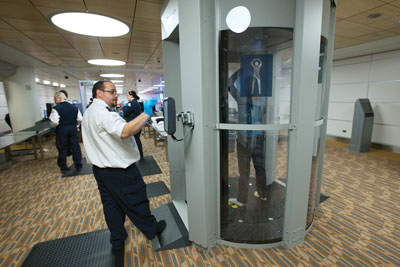
News
Legal Eagle: Enemy at the gates
What do Corinne Theile, Sam Wolanyk and Liam Corcoran have in common?
October 31, 2012 By Neil MacDonald
What do Corinne Theile, Sam Wolanyk and Liam Corcoran have in common? In the past few months, they either frustrated airline security or felt frustrated by it. Unfortunately, we see that frustration all the time when we head to the airport these days.
 |
|
| The Canadian government is considering developing a program to enhance security using specially trained observers. Photo: CATSA
|
So, why are we becoming more and more paranoid? I get that we may need to be screened when we cross an international border, but why do we need to be screened when we go from Montreal to Toronto, or Vancouver to Saskatoon? Is there really such a big threat to our security that would warrant the type of screening we now have to endure at airports? What are we gaining, and more importantly, what are we losing with this technology?
We certainly are letting our privacy rights slip away. Don’t get me wrong. As a pilot, I don’t want someone with a weapon on my aircraft, but as a lawyer, I can’t help but feel that the bigger threat is we are allowing government to look deeper and deeper into our private lives – and private parts!
Many airports in the United States are using either active millimetre wave (MMW) radio frequency (RF) technology, or back-scatter low energy radiation to scan passengers, and the public is not exactly amused. People don’t accept government assurances that the X-rays used are safe. Many feel that any radiation – however minor as claimed – is harmful. There are court challenges underway, but I doubt they will be successful. Add to that, a large anti-terrorism lobby in the U.S., and I think the din of this security paranoia will overpower those concerned about health or privacy.
The problem for Canadians, and the rest of the world, is that to fly into the U.S. we must follow suit. Our security screeners use MMW technology, not X-rays or other ionizing radiation like our neighbours. With only a small portion of the RF energy transmitted by the device absorbed into our bodies, the manufacturer and the feds assure us, it’s much safer to use than radiation scanners. I’ll leave that one for others to debate; my concern is with privacy.
The Office of the Privacy Commissioner of Canada has confirmed that privacy concerns have been “appropriately addressed” when it comes to scanning devices. They claim privacy is protected because the technology does not retain personal information, the scanned image and passenger names are never matched, and no other identifying information gathered.
These scanners show security personnel what we have hidden under our clothing. Corrine Theile, and Sam Wolanyk understand where this technology is heading, and decided to challenge U.S. authorities by baring most while going through security. Theile bypassed the scanner wearing only a bikini. Wolanyk was not as fortunate the first time, getting arrested for wearing little more than his Calvin Kleins. He has, however, sailed through more recently without being scanned.
Both are publicity stunts for sure, but they do highlight a need for this security “invasion versus threat” issue to be explored further. Yes, people can hide weapons or explosives in their underwear. The discovery of Umar Farouk Abdulmutallab, a.k.a. the “Underwear Bomber,” probably contributed more to our current paranoia than any other event in recent times. So, how then do we reconcile bypassing scanning devices wearing little more than underwear with what happened on that Northwest Airlines flight in 2009 when Farouk’s bomb did not explode? The simple answer is, we can’t. In the grand scheme of things, it doesn’t make sense, and the trajectory of the current technological privacy invasion means it will only get worse.
Is there a better, less invasive, way to deal with airport security? What about good old-fashioned profiling or – to be more politically correct – “passenger behaviour observation screening?” The Canadian government is considering developing a program to enhance security using specially trained observers, much like those in customs and in many police forces. This may be a more operationally effective, and much less invasive, program than having a look under our clothes, as is the case with scanners.
However, observation screening involves experience and common sense. Had the screeners in Manchester been more focused on observing people rather than relying on technology, they may well have asked why 11-year-old Liam Corcoran was able to board a flight to Rome without a passport, boarding pass or parent!
Like it or not, terrorism and the paranoia associated with it is here to stay. We need to be sensitive to this fact but we must at the same time be sensitive to the privacy issues raised by body scanners. Just because technology allows us to peep under clothing does not necessarily mean that we should, or even that we will be safer if we do.
Neil J. MacDonald is a pilot, lawyer, and aviation consultant. njm@neiljmacdonald.com This is not a legal opinion. Readers should not act on the basis of this article without first consulting a lawyer for analysis and advice on a specific matter.